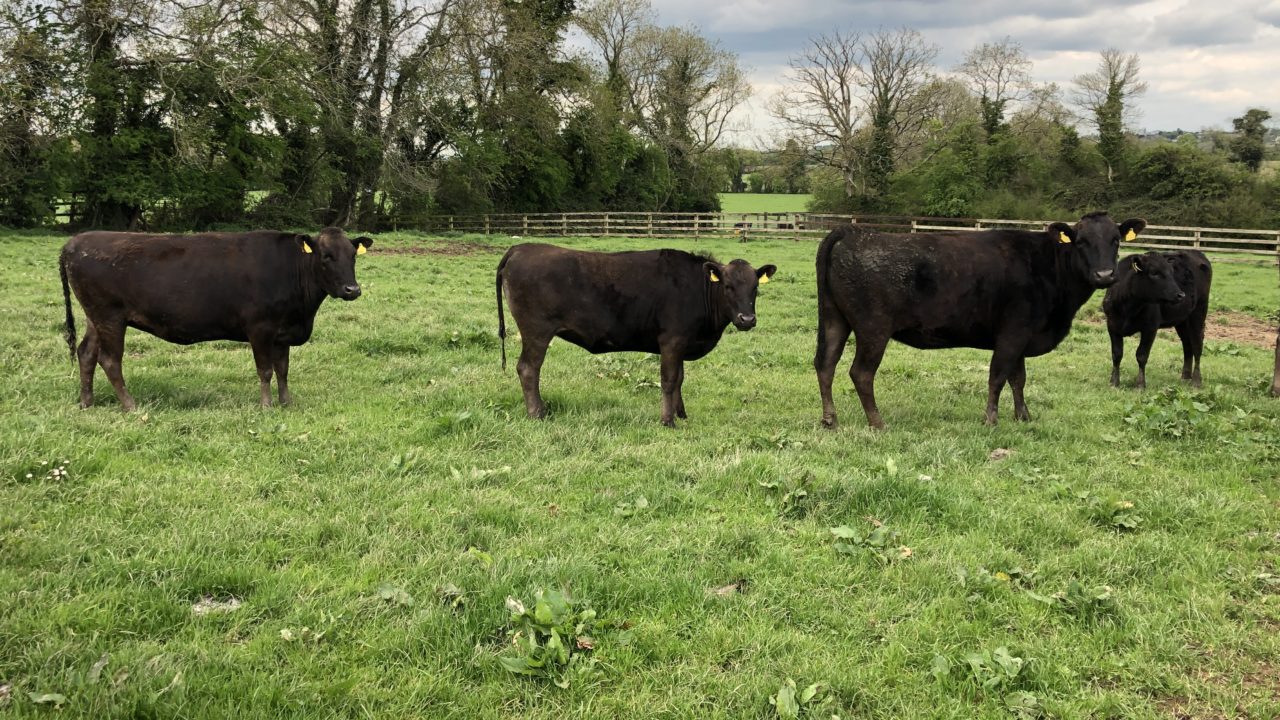Based outside Kilcullen, Co. Kildare, is a herd of rare-breed suckler cows which is composed primarily of registered full-blood Wagyu genetics.
Oliver O’Hanlon is the owner of the Ohanasaki Wagyu Herd (pronounced O-Hana-Sa-Ki), a most unusual herd prefix to find in Ireland, let alone Co. Kildare.
Agriland travelled to the farm ahead of the exciting sale which Oliver believes “is the first-ever sale of registered full-blood Wagyu cattle in Ireland”.

The breed of cattle are not found very often in Ireland with only a handful of farmers specialising in the breed, which originates in Japan.
Although rare, many farmers have heard of the breed before and its beef is known worldwide for its exceptional taste, as well as having the name for being the most expensive type of beef in the world and appearing on the menus of many world-class restaurants.
The Ohanasaki Wagyu Herd is home to 95 full-blood Wagyu cattle. The farm is home to approximately 40 cows, which are a mix of full-blood Wagyu cows and Hereford cows, which act as recipients for Wagyu embryos. The farm size is 110ac, all of which is in one block.
Oliver has first-hand experience in a wide variety of cattle breeds.
He explained: “I started out milking Friesian cows and then, in September 1992, we were the first importers of the Montbeliarde breed to Ireland or the UK.
“We were milking 70-odd Montbeliarde cows and stopped milking in 1997 when milk prices got very bad and we decided to switch to sucklers.”
Since then, Oliver has bred Piedmontese and Chianina cattle, as well as Belgian Blues, and now focuses solely on the Wagyu breed.
His reasons for selecting the Wagyu breed include that “they are extremely easy to keep”.
“They’re the easiest cattle to manage I’ve ever had. They calve themselves and have enough milk for their calves. We have never had an incidence of mastitis or hoof problems with them,” said Oliver.
The Wagyu cattle spend the summer grazing on the farm and are housed for the winter on a straw-bedded shed and fed silage and a small amount of meal.
The first full-blood Wagyu calves were born on the farm in 2008. Oliver imported the Wagyu genetics from Australia as embryos and since then, he has grown and developed his herd.
He explained: “My market is people who want to get into good Wagyu cattle. They contact me and I sell them the genetics.”
Oliver has sold progeny in France, Spain, Scotland, England and Wales to date.
He has been building and developing the Ohanasaki herd since its inception and is now, in his words, “overstocked”. So, he is having the sale to reduce the number of cattle on the farm.
“This sale will see some of the finest Wagyu bulls and heifers (as well as four steers) up for sale,” he said.
One of the most striking traits of the breed is that their conformation is very different to that of what most farmers would associate with being a beef breed of cattle, such as the Charolais or the Belgian Blue.
Oliver explained: “A good Wagyu bull doesn’t necessarily mean good conformation, it is related to the bulls marbling ability and the eating-quality of the beef.”
The sale
The Ohanasaki herd is currently gearing up for what Oliver has said is “the first ever sale of full-blood registered Wagyu cattle in Ireland”.
Oliver’s full-blood Wagyu cattle are all registered through the Australian Wagyu Association. There are 44 lots in the sale including steers, maiden heifers, in-calf heifers, bulls, as well as semen lots and embryo lots.
The sale is taking place due to lack of space for the stock and Oliver outlined: “I am selling off the best of heifers and bulls.”
There are 31 females on offer and six bulls, as well as two lots with two full-blood steers in each.
Embryos are offered from two donors in batches of ten using Trent Bridge F115 semen or semen that can be provided by the bidder.
Semen from two sires at three depots is also offered in the auction.
Bids can be emailed from May 20 to May 30, to Wagyu International.
The sale is expected to generate significant interest from overseas buyers and will no doubt arouse curiosity from many cattle farmers in Ireland also.






